#this is soooo beautiful
Explore tagged Tumblr posts
Text


Guys, I need your help! Find those posters for The Count of Monte Cristo on the internet, but I can’t finds its author. If someone knows - let me know, please 🙏🏽
#the count of monte cristo#posters#edmond & haydée#this is soooo beautiful#it looks like a fanmade right? looking for author to thank for this masterpieces 💖😭
15 notes
·
View notes
Note
This is it 😭
If I wrote all the things I love,
It would be my fluffy winter gloves,
And hot chocolate in ceramic mugs,
If I wrote all the things I love,
It would be autumn because,
Of the golden leaves and bleeding trees,
If I wrote all the things I love,
I’d write about stories,
They could never bore me,
If I wrote all the things I love,
The list would be long,
But most importantly,
You’d be number one.
It’s awful but never give up never whattt 💪💪💪
This is absolutely fucking beautiful why the hell would you it's awful????
Gods the starting and the ending(me being number one * cue hair flip.... just kidding) is just really good and I loveee how consistent the poem is with the theme and how the verses fit well together and like how you bring the ending "you being number one" at the end to bring more impact👏👏👏
Overall the poem is really good and I absolutely fucking love it and keep writing cause practise makes perfect
And don't call your poems awful or I'll come there and tie corquette bows all over you(jkjk ....not really)
13 notes
·
View notes
Text

source X
#not my art#this is soooo beautiful#test Muse: Peggy Carter#art from ultraraw26#can you exchange one queue for another
4 notes
·
View notes
Text
the people yearn for a loved-up sydcarmy!

should we get carrots tomorrow?
#this is soooo beautiful#i just keep coming back to it#established relationship sydcarmy you'll always be famous#timeskip them being all domestic and cuddly makes me so ill PLEASE chris storer PLEASE let them be together i beg
1K notes
·
View notes
Text

#photography#cute animals#wonderful#beautiful photos#photoshoot#photograph#cute#cuteness#adorable#picture#photographer#photooftheday#photografy#animal#dogs#animals#dogs of tumblr#photo#soooo cute#cuteeee#cuuuute#cuteeeee#so cute omg#so cuteee
3K notes
·
View notes
Text
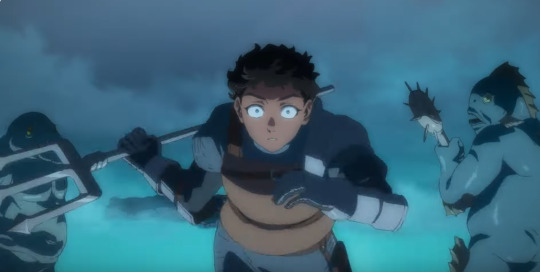

last thing you see before he fucking GETS YOU
#dungeon meshi#dungeon meshi spoilers#delicious in dungeon spoilers#delicious in dungeon#dungeon meshi kabru#god i wish he had beautiful brown eyes#his blue eyed stare is so scary#I love him soooo much#my post#kabru
5K notes
·
View notes
Text
will is so fucking intelligent its actually insane. i never realized that he suspected seizure after his first case of sleep walking. immediately after that he's in hannibal kitchen theorizing about physical disease. its so heart breaking to see the way he feels so sure of the problem from the start but lacks the confidence to take action when his support system doesn't see eye to eye with him. how many times in his life has he known something with aching clarity, only to be denied by those around him that doubt, dislike, or infantilize him? 
#the confidence he gains in season 2+3 is such a fucking game changer#i once saw this beautiful hannibal edit that called clarice genius and will ''very smart'' and it pissed me off soooo bad😭😭😭😭#yes he is gifted and his disorder helps his understanding of other people but that man is amazingly book smart. dont play w me.............#ash is mentally ill#hannibal#hannibal nbc#hannibal s1#will graham#hannibal series#hannibal season 1#coquiles
2K notes
·
View notes
Text
I am screaaaaaaming
together.

#arcane spoilers#arcane#jayvik#this is soooo beautiful#and the themes#my god#or my jayvik in this case?
5K notes
·
View notes
Text

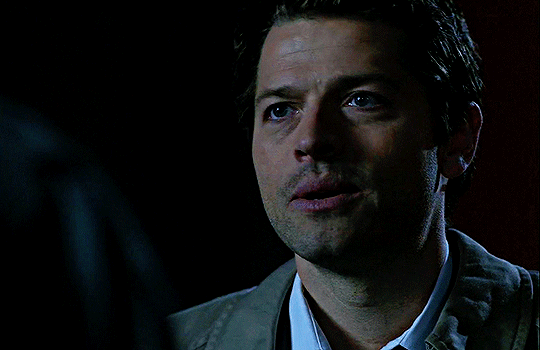




Explaining freedom to angels is a bit like teaching poetry to fish.
#spn#spnedit#supernatural#supernaturaledit#castiel#cas#casedit#castieledit#angelmade#userpenny#tuserjord#uservampgf#usergamer#happy birthday to me yayy have a gifset of my beautiful angel boyfriend that i miss soooo much#my love please come back our kids miss u too
1K notes
·
View notes
Text
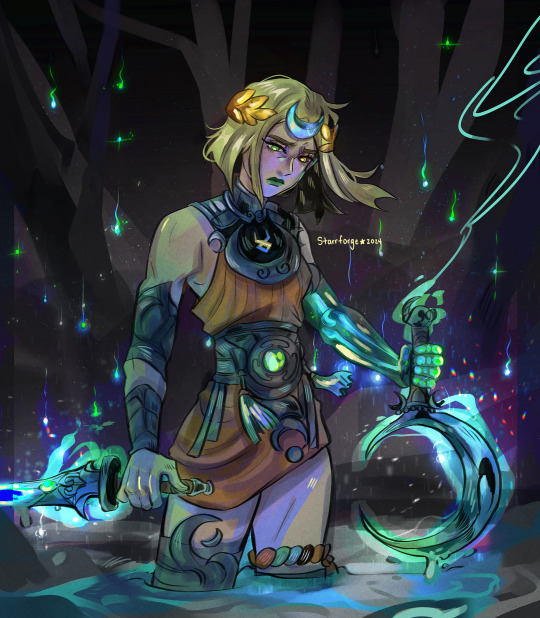
Are you ready, Melinoë?
#my art#hades 2#Melinoë#this game is sOOOO BEAUTIFUL!!!!#i literally love#so much already and ive only seen my hubby play for 20 min lmao.#also im really proud of this
2K notes
·
View notes
Text












If one day you think I'm a burden to you, just tell me you want to break up. No need for any reason. Maybe it's you who thinks I'm a burden.
See your Love (2024-2025) dir. Chiang Ping Chen
#this scene was so beautiful and so important#i love them soooo much#see your love#see your love the series#taiwanese bl#tvedit#bledit#jin yun#raiden lin#asianlgbtqdramas#asiandramanet#ali gif#useractivated#userrlaura#tusersilence#ninisdarlings#uservix#rinblr#vishingwell#long post#how do i make everyone watch this drama cause i need to see more content on my dash
657 notes
·
View notes
Text
Calling this a “Quickie doodle” is insane, this is so incredibly beautiful and well done. Ive never read this book, but I love this piece so much! (Had to google it was a book… I’m interested now)
Lan and Mo - quickie doodle.
I am taking the 'make lots of lazy art in 2025' resolution seriously.

235 notes
·
View notes
Text









Five billion octopath 2 scribbles i feel sick
#i know what you are wouldve made more sense w temenos i just really wNted to draw castti <\3 west continent crew my beloved#this isnt chronological at all. besides the first ones thats the first octopath i ever drew#like seconds after i finished castti and hikaris first chapter.#infected my brain so quickly i feel like a new person#i could write an essay on my octopath thoughts and rambling omfg.play octopath#art tag#octopath traveler 2#oh my god theyre all here ok#castti florenz#hikari ku#agnea bristarni#partitio yellowil#throné anguis#osvald v. vanstein#temenos mistral#ochette#dolcinaea luciel#veronica octopath#she didnt get a last name.SAD#i have more of these by the way.so many#ORIS HERE I GORGOT#ori octopath#i love ori. if i had to sacrifice myself but remembered how nice paritio was last minute i would also change my mind#oh ym god elenas here too#elena vanstien#shout out to you know how getting added to cotc im so happy.im scared if i say his name thisll show up in his tag and he isnt even here#he looks beautiful. and alive. awesome#the cotc artstyle is soooo pretty i saw castti and felt emotional#anyway. ot2. this is where ive been the past few months.#oh castti can inquire people. i know what you are does make sense for her heh
656 notes
·
View notes
Text







hey it’s one a them girl things
#dude imm SOOOO into dresses rn#they’re so pretty and flowy 🥹#cool to reblog#trans#transgender#trans mtf#mtf trans#trans femme#transfem#trans feminine#transisbeautiful#transisbetter#girlslikeus#trans is sexy#trans is beautiful#trans pride#trans positivity#trans princess#trans model#trans goddess#trans girl#trans girls#transgirl#transgirls#trans woman#this is what trans looks like
729 notes
·
View notes
Text


dinner and a show - miya osamu/f!reader (haikyuu!) part 9 in the bff!osamu series tags: angst, childhood friends to pining, mama miya deserves a netflix comedy special or a nobel peace prize, sometimes home is a person and sometimes that person wants you dead, finally a bit of communication i was about to call in UN peace keepers, things r getting FEISTY FROM HERE FYI this chapter is the literary equivalent of the elevator ride at the beginning of the haunted mansion

Mama Miya has always loved variety shows.
For as long as you’ve been coming over to visit the Miya house, if the family matriarch was present, there was a better chance than not that the television in the living room was on and there was some kind of spectacle unfolding on the screen—the louder the better, in her opinion.
She’d told you once that she just loves the way people laugh on variety shows, so loudly and freely, and that there’s nothing better than the sound of a house filled with laughter—and you know from lived experience that the Miya household had never been one that was short of joy, nor of it’s own chaos, in much the same way as those outrageous shows she loves so much.
As you grew up, you came to invariably associate that particular type of television show with the woman who had raised you like a second mother; sometimes when you missed her—when you missed home—you’d put one on just to bask in the cacophonous familiarity. But watching a variety show alone in your Osaka apartment pales in comparison to watching them together in the tidy living room of the Miya home, tucked under the kotatsu, sipping tea and eating fruit and occasionally making jokes about which one of the handsome male celebrities joining that week’s episode as a guest would be a better husband—comparing their heights and their jawlines and their variously successful careers in the entertainment business.
But right now, you’re not looking at the dashing star of that new historical drama who’s trying to climb up a rock wall against a ticking clock.
Instead, you’re looking at Miya Osamu who is standing in the doorway to the living room of his family home, and he looks like he’s just seen a ghost.
Though, in his defence, you probably don’t look much better.
Cradled in your palm, your satsuma rests unmoving—frozen in place just like the rest of you. It’s half-peeled to reveal the soft, pale orange flesh hidden beneath the pith, but you barely feel the weight of it as it rests forgotten in your outstretched palm. The scent—the one that just moments prior you’d been remarking was so fresh, so bright—seems duller now. Everything that isn’t Osamu seems to slip away to grayscale and to background noise; unremarkable against the stark contrast of his painfully familiar face.
Neither of you even blink.
Miya-san had just gone to the market to pick up a few things for dinner, after repeatedly insisting that you stay for a meal and eventually wearing you down. She’d left you in the living room watching TV, promising to make her trip to the store a quick one, and otherwise ignored your offers to join her.
She was supposed to be coming back soon, at any minute really, but suddenly you’re poised to flee. Everything in your blood is telling you, urging you, to run as quickly as you can—to preserve whatever tattered shreds of your sanity remain after the past six weeks of hell.
The six weeks that had felt more like a year. A war. A lifetime.
The six weeks that had seen you finally seek refuge in Hyogo under the guise of housesitting for your parents, who had gone travelling abroad—as convenient an excuse as any to escape Osaka and the troubles that plagued you there.
Little did you know that the troubles would have the same idea as you.
Your eyes flicker momentarily in the direction of the rear door of the Miya home, the one that leads out into the backyard—the yard that backs onto a little wooded grove where you used to play as children, running carefree and wild. The grove where you used to take naps in the shade on sticky summer days. The grove where you had once broken your arm. It’s foolish, you know, to even think about leaving; your shoes and coat are at the door, with only slippers on your feet and a thin sweater on your frame. Your own childhood home may be only a few houses down and around a corner from the one where you currently find yourself, a five minute walk at most even if your pace is leisurely, but dashing out the back door and making a break for it would be inadvisable—not least of all because there is a woman due home at any moment, one who has loved and raised you like one of her own, who is expecting you to be here when she returns. A woman who wants to share a meal with you and hear about your life. A woman who doesn’t know why you had come crawling back to Hyogo.
A woman blissfully unaware of how much unresolved tension is currently polluting every inch of her living room.
Your conscience is already heavy to begin with. You’d avoided Mama Miya for the past week—having faked a cold for a few days to buy yourself some time alone when you first got to town. She’d called you every day to check in, and she brought you homemade soup and medicine more than once. The very least that you owe her is a proper visit. You can’t possibly leave now.
Osamu’s lips part, his eyes—his deep, infuriatingly kind eyes—meeting yours.
“Ma doesn’t know I’m in town,” he says, and the first sound of his voice feels like a knife between your ribs. “I can go and come back later after… after you’re gone.”
He knows, you realize. He’s watched and understood every terrible thought that has raced through your mind since the moment he entered the room play out plainly across your face. You’ve always loved that about Osamu—how you hardly need to say anything at all in his company, and he still understands your mind and feelings just by reading the lines of your features.
Now it makes you feel sort of sick.
You mull his words over belatedly, having been too shocked to digest them in the moment at which they were spoken. Slowly you nod, the slightest little dip of your chin signifying your agreement to his offer. Accepting, tenuously but decidedly, his olive branch.
He seems to deflate slightly, a flash of hurt behind his eyes.
But it’s all too late, anyway.
“Samu?” Miya-san’s voice rings out through the house, incredulous but noticeably thrilled, the sound of the front door closing punctuating the eager call like a question mark. You hear rapid footsteps and the woman appears a moment later with a wide smile on her pretty face. “What’re you doin’ here?”
She sets her shopping bags down on the floor at her feet, wrapping her son up tightly in her arms and rocking him back and forth. You watch as Osamu smiles against the crown of his mother’s head—a gentle, peaceful look on his face as his eyes flutter shut—and you avert your gaze, because witnessing the tender moment is strangely and inexplicably painful.
“Just wanted to come home for a visit,” he murmurs, and it takes everything in you not to dwell too long on the way his figure towers over his mother in your peripheral vision—tall and broad and strong now, just the way she raised him.
“Did you two plan this?” the matriarch asks. She looks between the two of you as she finally pulls away from her son’s embrace, though her palms still gently rest upon his forearms.
“Nah,” Osamu laughs lightly, and to his credit he’s doing a very good job at acting like just being in the same room as you is not one of the most hideously uncomfortable moments of his life. “I had no idea she was gonna be here.”
“You didn’t tell him?” Osamu’s mother questions you, visibly surprised. And she’s right to sound so shocked, because if this was any other day—or at least any day that didn’t follow what had transpired between the two of you six weeks ago—Osamu would have been the first person you’d have told you were coming home. Would have been kept up to date, nearly to the minute, with any stop you made in your hometown or any variety show adventures you embarked upon with his mother. Would have known exactly what the two of you were having for dinner, how it was being prepared, and he would have received a photo of the meal when it was finally time to eat just to make him jealous (and because you know he likes to feel included on the visits where he isn't able to join you.)
“Oh, he knew I came home for the week,” you lie quickly, meeting Osamu’s gaze and suddenly hoping above all else that your thoughts are as clear to him as ever. He looks more startled by the sound of your voice than you expect him to. “Just didn’t know I’d be here today, since I stopped by so last minute.”
Osamu swallows, then nods. “Yeah.”
Mama Miya smiles and clasps her hands together. “Well, this is such a nice surprise! Tsumu’s not hidin’ somewhere waitin’ to scare me, is he?”
“’S just us, Ma,” Osamu laughs lightly, and she reaches up to pinch his cheek affectionately. You don’t miss the way his eyes flicker over to you when his mother turns her back.
You’re still holding your satsuma in your hand, but you no longer have the faintest desire to eat it.
“Needa hand with those?” you hear Osamu ask his mother as she picks her shopping bags up from the ground. You hear some rustling, and can only assume she’s elbowed him based on the way he yelps and then laughs. “Ow! I’m just tryin’ to help!”
“Ya hardly just got here yourself, bag’s still at yer feet and everythin'!” his mother chides him, but it’s full to the brim with love. “Just sit down and relax for five minutes, will ya? Yer lookin’ dead tired.”
His mother waves him over insistently in the direction of the kotatsu where you’re seated before she shuffles off towards the kitchen, the plastic bags in her hands swishing as she goes.
His mother is right: Osamu looks, without softening your words, haggard. He’s got shadowy rings under his bleary eyes, his skin looks dull, and his hair still has a faint ring indented around the circumference of his head from his trademark baseball cap. He looks like he did when he first set up his business—tired, stressed, wearing a little thin at the edges from the portrait of his usual self.
You wonder if you look the same in his eyes.
Mama Miya had remarked similarly on your own appearance when you showed up at her door earlier that afternoon, but you at least had the falsified alibi of having been recently ill to hide behind.
Osamu is watching you from the doorway, still hesitating to move any closer—like a man who stumbled upon a beast in the wild, and is equally parts fascinated and petrified.
You look away.
“Sit down,” you tell him, your voice quiet and slightly cold as you stare at the orange in your hands. “She’s gonna think something’s wrong.”
Something is wrong, you both know that truth all too well, but the last thing you want is for her to know that. This entire situation between the two of you is already bad enough without the shame of other people knowing. Without his mother, of all people, knowing.
Osamu nods, and then approaches the kotatsu slowly. When he lowers himself down to the floor, he takes the seat opposite you at the small square table instead of beside you like he normally would. Something in that contrast stings a little bit, though you’re certain you’d be more upset if he was any closer than he already is—you’re suddenly exceedingly conscious of the possibility of your legs brushing underneath the table, and it makes you shift nervously, drawing your limbs as close and compact to your body as you can.
Osamu is so still on the other side of the table that it’s almost uncanny. Statuesque in a way that might make you laugh if this whole mess wasn’t so harrowing, if the wound wasn’t still so fresh. You’re not even sure he’s breathing.
“Just… be normal,” you whisper, finally setting your forsaken orange down and reaching up to rub at your temples where you feel the beginnings of a tension headache thrumming beneath the skin. You sigh, long and drawn-out. “I don’t want her to worry.”
He nods again.
The television show continues to play on across the screen beside you both, and while your eyes may be on the screen, you doubt either of you are paying much attention to it. You roll your half-peeled orange from one hand to the other idly across the tabletop, occasionally picking away at the skin.
Mama Miya appears with more plates of fruit not long after, having taken time to cut them up for you both even though she’s already busy preparing a meal in kitchen—the sounds of sizzling and her knife against the chopping board having filtered down to the living room while she worked.
“Sure ya don’t need any help in there, Ma?” Osamu asks, peering up at his mother as she cranes down to set a plate of apple slices in front of him.
“I fed you and yer brother just fine for 18 years, didn’t I? I know how to make a meal,” she jokes, returning to her full height and wiping her damp hands on the front of her apron. She glances over at you, smiling knowingly as she rests her hands on her hips. “Besides, ya haven’t seen this little thing all week—I’m surprised you two aren’t hangin’ off each other like ya usually do.”
Your eyes meet her youngest son’s, and you both quickly look away.
You can’t help but wonder if the woman before you suspects something then, even if she doesn’t say anything and in spite of your careful attempt to conceal it. But with two boys like hers, her sense of perception has long been honed to a fine art—she knows when trouble is brewing long before it strikes—and it wouldn’t surprise you in the slightest to learn that she’d known something was off even before that small slip-up. Maybe she’d known from the moment you’d shown up at her door that afternoon. Maybe she knew the second she heard from your mother that you were coming back to Hyogo.
Dinner is awkward.
Maybe not overtly—there aren’t prolonged silences, or tense stares across the table, or any real moments of palpable discomfort—but it’s a careful balancing act between you and Osamu pretending to be up to date with each other’s lives, and neither of you navigate the steps particularly gracefully. You mention one of Osamu’s employees, asking how they are and what they’ve been up to at the shop since you’ve been home in Hyogo, only for Osamu to “remind you” that they had moved up to Sendai to go to school earlier that month. He mentions a project you were tasked with at work, and you awkwardly stumble when you explain that it had changed hands a few weeks prior. He didn’t know you were “sick”, you didn’t know he’d gotten a glowing review from a notoriously harsh food critic. Neither of you even try to mention Atsumu in fear of getting the wires of your falsified stories crossed.
You try to keep quiet as much as you can, after that. You sit back in your chair, picking at your food and contenting yourself with watching the Miyas chatter away across the table before you.
Osamu and his mother eat the same. You’ve noticed it before, but now you have time to really dwell on the observation. They hold their chopsticks in the same slightly peculiar way, just a bit too far forward to seem comfortable. They pile food on their plates in the same order. They even occasionally reach to sip from their glasses at the same time.
How familiar it all is makes your chest feel achy like a bruise, because there’s an undercurrent of something being just slightly off. You’ve sat at this same dining room table a hundred times, shared meals just like this one too frequently to count them, but this time something feels different.
Fortunately there’s plenty to drink to accompany dinner, and the alcohol helps balm the sting.
Mama Miya is pouring you another glass of sake when she asks, “So are you two drivin’ back to Osaka together tomorrow?”
Osamu freezes with his chopsticks lifted half-way to his mouth, and the two of you share a glance from opposing sides of the table, trying to telepathically draft some kind of cover story. You had already told her that you were planning on heading back to the city tomorrow around noon, but you have no idea what Osamu’s plans are.
“Not sure yet,” Osamu says eventually, wiping at his mouth between bites of food. “We were plannin’ to play it by ear. I thought about stayin’ till tomorrow night since I made plans to visit Kita-san in the morning.”
Mama Miya accepts this lie easily, and the conversation continues on.
You resent how easy it is to slip into routine with Osamu. It’s been six long, terrible weeks since you last laid eyes on him, but soon you find yourselves finishing each other’s sentences, passing condiments across the table before even being asked for them, and filling each other’s glasses when they’re empty without thinking. It all comes back to you like second nature.
Because it is, maybe.
“Ya need a haircut Samu,” the woman at the head of the table says, her words a little slurred and her cheeks blazing bright pink thanks to the sake. Mama Miya loves to drink, but can’t hold her liquor for anything—it’s always reminded you of Atsumu.
“Do I?” her son reaches up and ruffles his hair absentmindedly, leaning back in his chair. “Got it under my cap so much I don’t really notice.”
His mother is right: Osamu’s hair is longer than he usually lets it get, as he tends to keep it short and easy to manage now that he’s working at the shop. It hasn’t been this long since you were in high school, and there’s a little tendril of dark hair that curls right beside his ear that you find you can’t stop staring at.
“Maybe I’ll buzz it all off,” Osamu finally says with a shrug.
You and his mother both make similar sounds of disgust.
“You and yer brother are my flesh and my blood, and I love ya more than anything,”—Mama Miya rests a hand across her chest dramatically, her expression somber—“but I’m telling ya right now yer heads were not shaped to sport buzzcuts.”
You can’t help but laugh into your hand at the impassioned remark.
“What about letting that little thing at ya again with a pair of scissors?” the woman beside you juts a thumb in your direction as she questions her son.
“Not a chance,” Osamu snorts, glancing fleetingly over to you.
You’d once cut gum out of Osamu's hair when you were both nine—a gift courtesy of Atsumu—and to the best of your recollection, you did pretty well for someone who wasn’t even tall enough to ride most of the attractions at amusement parks.
“I did a great job,” you gripe huffily as his slight.
“My hair was lopsided,” Osamu reminds you pointedly.
“Maybe I was going for something avant-garde, something high-fashion.” You roll your eyes as you reach for another piece of meat from the dish at the centre of the table—pinching it in two with your chopsticks and placing the other half onto his plate without thinking. “Guess I'm asking too much for a guy who wears that same baseball cap and cycles between three t-shirts day in-day out to understand my vision.”
Mama Miya cackles at the jibe, tipping her glass back to drain it. “Oh, you two crack me up.”
Osamu smiles a little, picking up the piece of meat you’d just given to him and popping it wordlessly into his mouth.
When dinner is done and the plate are cleared, Osamu washes the dishes and you dry them—assuming the roles you two have long claimed after sharing countless meals together. You work side by side at the sink in quiet, with just the clink of dinnerware, the sloshing of dishwater, and the sound of Mama Miya laughing along to a variety show in the other room to be heard between you.
She’s had enough sake now that you aren’t as worried about her picking up on things, so you can let the facade drop slightly—you can just exist in an uncomfortable quiet without fretting so much.
You’re not sure which is worse: the pretend ease, or the very real discomfort.
“I’m gonna head out now,” you call to the woman laying on the sofa as you poke your head through the doorway to living room, all the dishes from dinner now dried and put away. Osamu shuffles past you to take a seat beside his mother on the sofa.
She stares at him like he’s grown a second head as he settles down next to her, her lips parting as her eyes remained glued to him.
“Aren’t ya walkin’ her home?” she asks, bewildered.
As kids, neither you nor the twins had been particularly concerned with walks home—or anything remotely close to etiquette. The three of you would stand at the corner half-way between your homes, exchange a few parting words and maybe an insult or two, and then go your separate ways—only to repeat it all again the next day. But that changed in your early teens, rather unexpectedly really, and the twins have never ever let you walk home alone since.
It wasn’t always both of them accompanying you—sometimes it was just one or the other—but one of the two always made the walk alongside you, no matter how short it was, or how late it had gotten, or if the weather was unpleasant. One of the boys always followed all the way to your door and waited until they knew you made it inside, without fail. At first you found this strange development overbearing, and then humiliating when you found out that their mother had told them it was something they had to do, but over time you found that you were grateful for it.
You grew up in a very safe neighbourhood. You never felt any real danger making the short walk on your own. But doing it with the twins’ company made made you feel cared for, protected almost—even before you knew about all the terrible things out there in the world that made women need escorts home in the first place.
Osamu is quiet at your side as the two of you shuffle along towards the corner where your streets meet. He stands nearest to the roadway, with his hands shoved into the pockets of his jacket and his eyes on his feet. It’s the very same path the two of you have walked a thousand times in just the same way, no doubt your feet falling into the exact parts of the pavement they’ve already tread before. But the walk home has never felt like this. The two of you have never been so unsettled in each others’ company.
You stop when you reach the corner, your feet cementing themselves into place as solidly as the ground beneath them.
“This is far enough.”
Osamu stops, already half a step closer to your house than you are since he hadn’t anticipated your sudden halt. He looks at you, a furrow making itself known between his brow like your words aren’t quite registering in his brain. He’s never walked you just halfway before, and maybe that’s why he’s hesitating.
You blink hard a few times, then move to step past him and leave, already making plans to take an earlier train back tomorrow just to avoid running into him again. Your little neighbourhood is much smaller than Osaka, and Osamu’s presence is too loud here to ignore.
But you’re glad, at least distantly, that you made it through the evening relatively unscathed. Tender and bruised, certainly. But the wounds you’ve been trying so carefully to mend over the past six weeks seem, largely, to have stayed knitted closed.
You can see your house from the street corner as you step towards it, the windows dark and waiting for you. You’re looking forward to scrubbing the day from your skin and then crawling into bed, hoping you can forget all about—
“I’m sorry.”
Your body goes stiff, and your feet—without any conscious command—stop carrying you forward. You stand with your back to him, your shoulders rigid like raised hackles, but you know Osamu is still there.
Still watching.
Still waiting.
Your teeth bite down hard into the flesh of your cheek.
You muster every shred of resolve that you can, and weave the iron of your will into your throat to make sure your next words ring firm. “Osamu—“
“No, I need to say this,” he interrupts you before you manage to say anything at all, and he sounds desperate. “It’s all I’ve been thinkin’ about fer weeks.”
You’re angry. Furious, suddenly. A white hot rage boiling up in your throat that tastes bitter and revolting and wipes away any lingering trace of sake on your tongue. All Osamu has been doing lately is whatever the hell he wants, and it’s really starting to piss you off.
You just want to go home. You just want to throw the meagre amount of belongings you’d carted to your parent’s house with you into your suitcase, hastily dump too much water into your mother’s houseplants to hopefully get them through the weekend, and then get the hell out of Hyogo.
You don’t want to be here.
You don’t want to hear this.
“I know I’m bein' selfish. I know that all of this is because of how selfish I’ve been. What I did that night wasn’t fair.”
You’re listening to him in spite of yourself. In spite of the fury ringing in your ears. In spite of the pain in your gut that feels like stitches tearing.
“I know what I did was fucked up. That it… That I ruined somethin’. That even if you can forgive me, everythin’ will always be a bit different now because of what I did—and I am genuinely, from the bottom of my heart, sorry for that.”
You find yourself softening. Or maybe wilting slightly—withering under the warmth of his words.
“But I’m not sorry fer how I feel,” Osamu’s soft words sound remorseful only because he isn’t in the way that matters most to you. “I can’t be. I tried ‘n I can’t.”
You feel yourself shaking your head, intimating the dissent you feel but can’t bring yourself to voice. Your feet are still stuck, keeping you there. Trapped by your body against your own conscious will. You’re so nauseated you think you might be sick.
Osamu sucks in a breath that shakes on the inhale. “I’ve loved you my whole life, y’know that? I don’t even know what it feels like not to, so callin’ it that doesn’t even feel right most days,”—there’s a waver in his voice that cuts through you like a blade—“And maybe it used to be different, or maybe it’s always fuckin’ been like this, but I have been a god damn mess for the past six weeks tryin’ to think of a way that I can do this without you and I came up with nothin’, because there’s not a single part of me or my life that isn’t the way that it is because you’ve always been there.”
You’re choking. You’re choking now. You can’t swallow. You can’t breathe. Your throat is a vice that you can’t pry open, that you can force neither air nor words through when you need to. Your heart is lodged, firm and unmoving and worn raw, in the hollow of your throat.
You finally turn to look at him, but your sight is blurring at the edges.
His face is so pale that part of you—the part that has cared for him for as long as you've cared about anything—worries he might faint. His expression so grave he looks like he’s in the throes of mourning. It’s unfair that grief colours him this way. That even in this moment, under the buzzing streetlight, with the world shifting underfoot, that he should still be so handsome. That he should still look like your Samu.
“I know that this is a shitty situation that I caused. But I couldn’t do it anymore. I needed you to know how I felt—how I feel—because it was eatin’ me alive. And even without Tsumu’s party it would have happened eventually. Maybe it woulda happened better, or maybe it woulda happened worse, but it still woulda happened—because no matter how I went about it or what I’m fucking up by sayin’ it, it’s true.” Osamu squeezes his eyes shut tightly, swallows, and then opens them again to fix you in his stare. “I’m in love with you and I always have been.”
“I lost you both, Samu,” your voice is quiet and brittle when you finally find it in the knot of your throat and let it free. “I know that’s partly my fault, but I just couldn’t look at Tsumu and not see you. It hurt too much. Suddenly the two most important people in my life just weren’t there anymore. That’s not fair.”
Because this is bigger than just the two of you. It always has been.
“I’m sorry,” Osamu says to you, but his words are so faint they risk being lost in the cool evening breeze.
“Please stop apologizing to me,” the only reply you can bring yourself to utter reflects every bit of your exhaustion—your voice is flat and lifeless when you speak the words.
The two of you stand there on the street corner, the half-way point between your childhood homes, and it’s so impossibly quiet.
“I don’t know where we go from here,” you say as you pull your coat a little bit tighter around your frame, and for the first time all night it feels like the only time you’ve been truly honest.
Osamu looks at you, and if you sort through all the emotions in his eyes, you know you see the same feeling reflected back in his stare.
On Sunday evening, Osamu makes his way back to Osaka alone, and the house you grew up in is dark and empty when he passes it. As he drives back to the city, he can’t quite shake the feeling that neither of them—not Hyogo, not Osaka, nothing and nowhere in between—feel quite like home to him the same way that they used to.
#megumi reads#megumi and osamu#megumi and haikyuu#can i just say that i'm now a sobbing mess?#like this chapter wrecked my heart and soul#in the most excruciating way possible#my heart aches for samu#but my heart also aches for reader– for us#damn ma this shit hurts so bad#sobbing crying wailing#i also love the fact that they had the conversation on the corner of the street#like halfway from both their homes– halfway from the both of them#this is soooo BEAUTIFUL#delicious angst#that's it. just pure angst
398 notes
·
View notes
Text
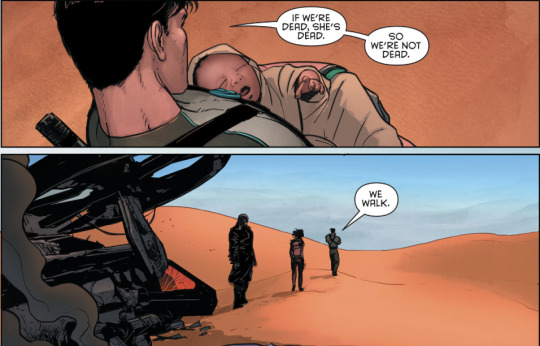

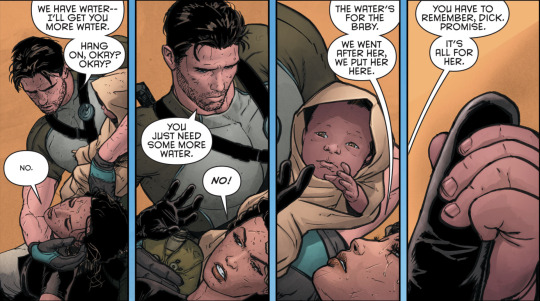



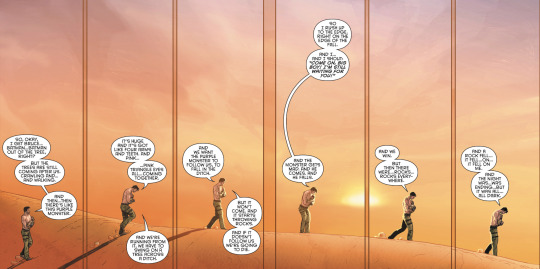
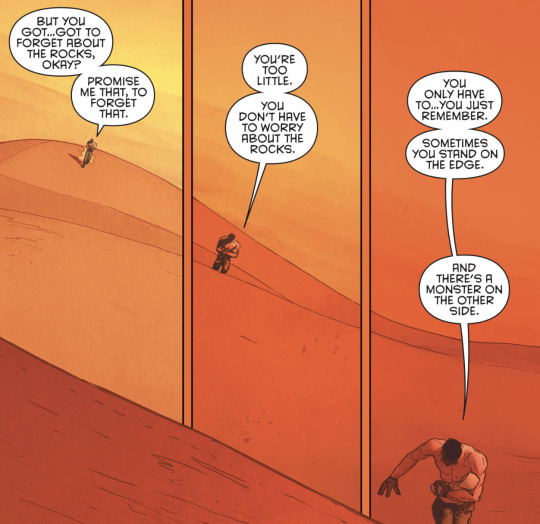



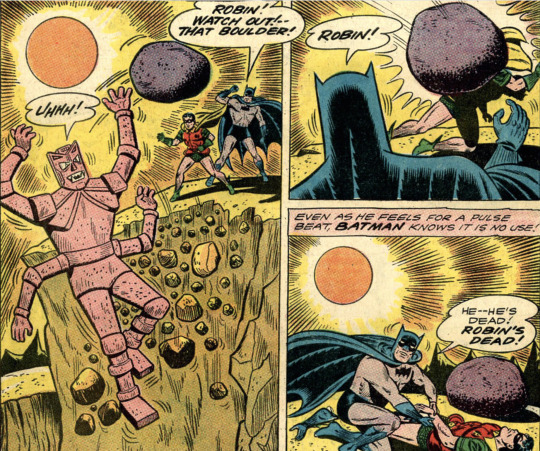
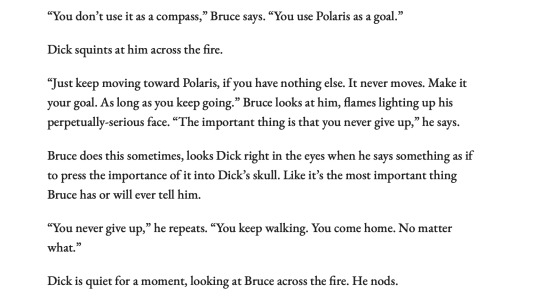

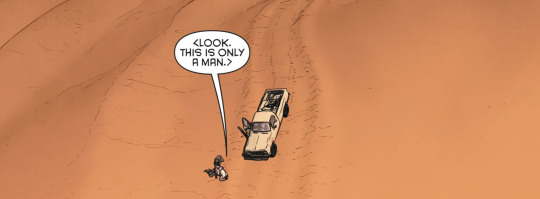

dick grayson in the arabian desert
grayson (2014) #5 // wild geese by mary oliver // when did it happen? by mary oliver // the body keeps the score: brain, mind, and body in the healing of trauma by bessel van der kolk // batman (1940) #156 // north star by starlingsinwinter
#dick grayson#desert baby arc my absolute beloved#webweaving#the way i was possessed by this idea needs to be studied i cannot be normal about grayson 5 ever#also huge shoutout to lys for helping me with the font for cam's beautiful fic <3 my mutuals are soooo lovely#if u haven't read it yet go do it RN it's soooo gorgeous and heartbreaking and poignant#dc comics
447 notes
·
View notes